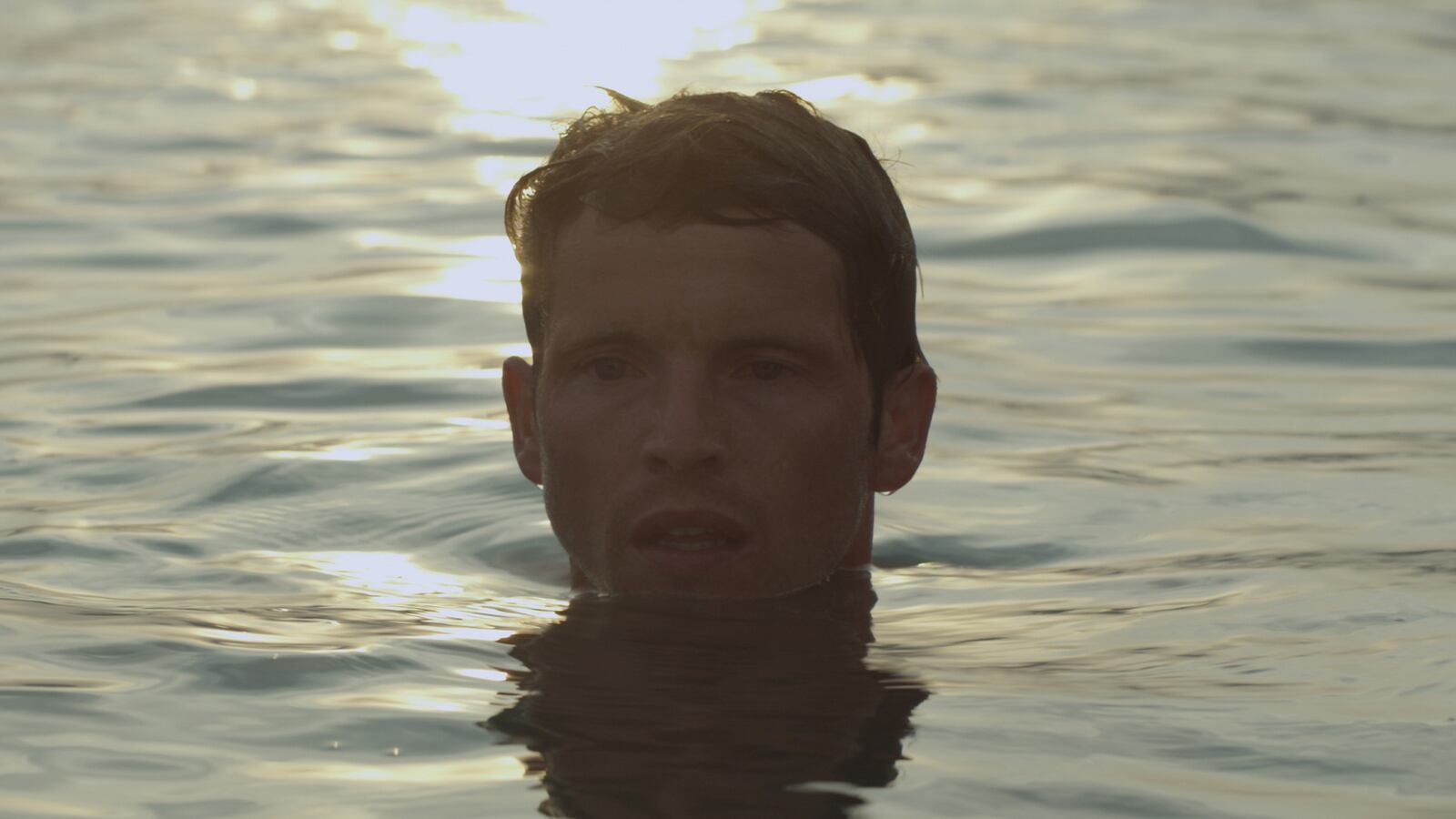Adventuresome moviegoers can thank the Oscars as bunnies can thank spring. One can have a ball at the sight of the other.

There is currently a flourish of thoughtful foreign movies such that a visit to the indie theaters near you can resemble attending a great film festival. And since the Academy only nominate five titles for best foreign language film—this year they are The Great Beauty, The Hunt, Omar, Broken Circle Breakdown, and The Missing Picture—other worthy contenders get ignored at the box office, as foreign films are given to. That’s not to mention that perhaps the best foreign films of the year showed their heads too early in the season, like Beyond the Hills, Something In the Air, Like Someone In Love, Blue Is the Warmest Color, Caesar Must Die, and A Touch of Sin.
But if you missed those offerings, the current pre-Oscar swell that’s upon us should satisfy gutty viewers, and you can start by enjoying France’s Stranger by the Lake right now.
That is, as long as you’re not bothered by “the male gaze,” whatever that is, since Stranger by the Lake will make Blue Is the Warmest Color look like your sister’s baby shower. Stranger by the Lake is nothing but the male gaze. It takes place entirely around, yes, a lake, a cruising spot for gay men who begin by quietly sunning themselves on shore or peacefully swimming across the glassy surface. Into this natural reserve comes Franck (Pierre Deladonchamps), who roams around vulnerably and longingly staring at the men populating the spot, and strikes up a Platonic friendship with a heavyset, middle-aged man named Henri (Patrick d'Assumçao). And since the title promised a lake, it delivers on the stranger, too, who comes in the form of a dead ringer for Borat, the id to Henri’s ego, who brings to the so far idyllic, dreamlike proceedings a dark, nightmarish death drive, a package coiled with passion and sex.
Franck finds this offering irresistible, for how else would you explain that, after he’s witnessed him drown his boyfriend in the middle of the lake, that he retreats into the forest with him and has passionate intercourse, un-simulated, and complete with ejaculation for all to see? The stranger remains anonymous until after he’s coupled with Franck, at which point he tells him that his name is Michel. It’s nice to meet you.
There are layers of perplexing dialectic in Stranger by the Lake—lust and death, talk and sex, dream and nightmare, looking and hiding, rules and recklessness. Hitchcock offered this tension as well, preferring not to serve up “15 seconds of surprise” (a completely unexpected explosion) but rather providing the viewer with “15 minutes of suspense” (the knowledge that there is a bomb underneath the table). The director, Alain Guiraudie, delivers something like 80 minutes of suspense, as we wonder what Franck is thinking, and we shout at the screen, “Michel is a psychopath! What are you doing?”
But it is the Hitchcock tradition to be so ironic, and to mock society’s norms. At one point, a man masturbates to the sight of Franck and Michel laying beside each other, but Michel tells him that they are talking and to come back when they are fucking. The same man later gives Franck oral sex, and having finished and for a few seconds not quite knowing what to do, shakes his hand and leaves. The duty to flip the rules of desire, and to have fun going about it, has been handed down by Hitchcock to the Frenchmen Truffaut and Chabrol, and now to their heir, Guiraudie. After all, it is Hitchcock who said, “Every film I make is a comedy.”
***
The Chilean film Gloria, written and directed by Sebastián Lelio, also manages to be drama, thriller, and comedy all at once—not all in one, but all at once. Gloria (Paulina García) is a middle-aged divorcee who visits single bars and falls in and out of an affair with an older man, and every moment that she is on screen there is a sense that either melancholy, trauma, or hilarity will burst forth, tipping the film towards one genre or another, making an easier task for the categorizer. But instead a balance is maintained that preserves the beauty of a complex woman, even as she threatens to become unhinged. Gloria has at her disposal the whole range of human emotions, and this is how character-study ought to be done. The best angels and the worst demons of our nature are perched on our shoulders—nobody can be confined to one manner of behavior. Movies, you realize, are great at reminding us that it’s fun to flirt with danger, to live a little.
Some things, however, we will always try to control and protect—say, our children. But in Hirokazu Koreeda’s Like Father, Like Son, well-to-do architect Ryota (Masaharu Fukuyama) and his wife Midori (Machiko Ono) have meticulously raised their 6-year-old son Keita into an adorable, sheltered boy. But one day the hospital where he was born notifies them that Keita, in fact, is not their son, and a nurse had mixed up two babies in the ward. Their real son, Ryusei, has been brought up by a poorer, rowdier clan. Keita’s hobbies include piano lessons and Wii tennis, while the best props at Ryusei’s disposal are whatever he can grab a hold of to point as if it’s a gun. The hospital urges the parents to swap the boys, and to do it soon—it’s the “right” thing to do, as dictated by tradition, and Japan is nothing if not an ostentatiously traditional society. But Ryota, something of a symbol of Japan’s uptight rigidity, hatches a cruel, heartless plan to take custody of both children. We understand—who would want to give up the angelic Keita, even if it means raising a cuckoo? Whatever the outcome, heartbreak is guaranteed.
But Koreeda always rescues his best films from somberness. There’s After Life, about ghosts who must choose a single memory from their life to re-experience, like a YouTube clip on loop, for eternity. It is a bummer that they have to choose, but once they make a decision, they can’t be happier, or more relieved. And then there is the sublimely nostalgic Still Walking, a member of the species of family reunion films, although the occasion for the get-together of the Yokoyama clan is the anniversary of the death of a favorite son. Gathering, loss, regret, and parting ways—this is familiar territory for Koreeda. But Still Walking is bathed in lovely summer light, and it floats on air. The blue notes are drowned out by sounds of gyozas frying on a pan—Koreeda loves to film food. Consider the scene in Like Father, Like Son where Keita witnesses his biological parents’ family storming a big bowl of dumplings, and the poor guy, almost shocked by the ambush, struggles to pick up one of the slippery little things. We, the viewers, fall in love with Keita, and we don’t even have any claim to him. Forget the father—imagine what the mother must feel.
Finally, there is The Selfish Giant, allegedly adapted from Oscar Wilde’s short story of the same name. The film’s plot can hardly be said to match Wilde’s allegory, and certainly the setting does not. The movie takes place in the impoverished northern England town of Bradford, and centers on barely-teenage boys Arbor (Conner Chapman) and Swifty (Shaun Thomas), who spend their days collecting—or stealing—electric cables and selling the copper to a scrap metal dealer with the ironic name of Kitten (Sean Gilder), who might or might not be the titular repentant giant. There have been so many films set in the grey wastelands of post-industrial England that you might think, not again. But the director, Clio Barnard, doesn’t do stark for stark’s sake, and she draws from Wilde’s sweet, sad fairy tale the same fragile hope of redemption.
The Selfish Giant, Like Father, Like Son, Gloria, and Strangers by the Lake are not the easiest films to sit through, but they are not indulgently bleak. It’s already a shame that Oscar gold will elude these gorgeous and complex works; even more tragic if they get ignored by viewers who had no problem with the cheery 12 Years a Slave or Inside Llewyn Davis. There shouldn’t be a double standard just because of the presence of subtitles.






